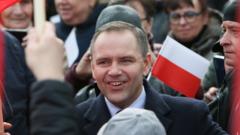With an upcoming election, Nawrocki's bizarre promotional tactics raise questions about his suitability for office.
**Polish Presidential Candidate Faces Backlash After Disguise Scandal**

**Polish Presidential Candidate Faces Backlash After Disguise Scandal**
Karol Nawrocki, a historian and presidential candidate, ridiculed for promoting his own book under a pseudonym.
In a bizarre twist in the Polish presidential race, candidate Karol Nawrocki has become the subject of ridicule after revelations surfaced regarding his past promotional stunt for a book he authored under a pseudonym. The book, written under the name Tadeusz Batyr, chronicles the life of a gangster during Poland's communist era, yet it appears Nawrocki, a historian and right-wing Law and Justice party (PiS) supporter, had more than just literary intentions behind this alter ego.
In a televised broadcast back in 2018, Nawrocki appeared disguised as Batyr, complete with a hat and obscured face, where he offered self-praise, claiming that his own scholarship deeply inspired the fictional persona: "This historian [Karol Nawrocki] actually really inspired me…" the cloaked figure stated, humorously acknowledging his own contributions to the study of organized crime in communist Poland.
The absurdity deepened when it was found that Nawrocki had previously claimed in a social media post to have personally met Batyr, describing an elaborate interaction in which he provided guidance to the fictional author. As this revelation circulated, Polish social media lit up with mockery, questioning whether it would be Tadeusz Batyr or Karol Nawrocki on the campaign trail.
When pressed for comment, Nawrocki shrugged off the criticism, claiming "literary pseudonyms are nothing new in Polish academia” while returning to his self-aggrandizing remarks. He maintains a keen interest in the underworld and has connections with known figures from organized crime, albeit suggesting that these relationships are purely professional.
Amidst this controversy, Nawrocki sits second in the presidential polls, trailing behind Warsaw mayor Rafal Trzaskowski. Meanwhile, far-right candidate Slawomir Mentzen is gaining traction, advocating for extreme tax cuts and an anti-immigration stance. The election's outcomes could hold significant weight, as Poland continues to be a pivotal player in Western support for Ukraine.
Political experts are closely watching the unfolding race. Marcin Zaborowski, a political analyst, emphasizes the stakes, particularly given the differing approaches each candidate has toward European relations and domestic reforms. Should Civic Coalition's Trzaskowski gain presidency, it could expedite reforms key to progressive agendas that have stalled under President Andrzej Duda's veto power.
With less than two months until the first electoral round, the pressure mounts for Nawrocki, who is now scrambling to differentiate himself from his fictional counterpart and rally voter support in a race that could determine not just Polish domestic policy but also its position in international relations.
In a televised broadcast back in 2018, Nawrocki appeared disguised as Batyr, complete with a hat and obscured face, where he offered self-praise, claiming that his own scholarship deeply inspired the fictional persona: "This historian [Karol Nawrocki] actually really inspired me…" the cloaked figure stated, humorously acknowledging his own contributions to the study of organized crime in communist Poland.
The absurdity deepened when it was found that Nawrocki had previously claimed in a social media post to have personally met Batyr, describing an elaborate interaction in which he provided guidance to the fictional author. As this revelation circulated, Polish social media lit up with mockery, questioning whether it would be Tadeusz Batyr or Karol Nawrocki on the campaign trail.
When pressed for comment, Nawrocki shrugged off the criticism, claiming "literary pseudonyms are nothing new in Polish academia” while returning to his self-aggrandizing remarks. He maintains a keen interest in the underworld and has connections with known figures from organized crime, albeit suggesting that these relationships are purely professional.
Amidst this controversy, Nawrocki sits second in the presidential polls, trailing behind Warsaw mayor Rafal Trzaskowski. Meanwhile, far-right candidate Slawomir Mentzen is gaining traction, advocating for extreme tax cuts and an anti-immigration stance. The election's outcomes could hold significant weight, as Poland continues to be a pivotal player in Western support for Ukraine.
Political experts are closely watching the unfolding race. Marcin Zaborowski, a political analyst, emphasizes the stakes, particularly given the differing approaches each candidate has toward European relations and domestic reforms. Should Civic Coalition's Trzaskowski gain presidency, it could expedite reforms key to progressive agendas that have stalled under President Andrzej Duda's veto power.
With less than two months until the first electoral round, the pressure mounts for Nawrocki, who is now scrambling to differentiate himself from his fictional counterpart and rally voter support in a race that could determine not just Polish domestic policy but also its position in international relations.



















